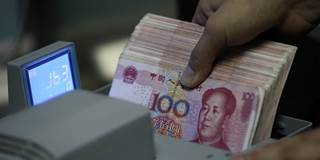China’s decision to tighten its grip on the renminbi's exchange rate indicates that it has no intention of playing by the rules of the game. Indeed, if the Chinese government were serious about opening its capital market, it would have to implement reforms that would threaten its model of political and economic management.
SANTA BARBARA – Last week, the Chinese government tightened its grip on the renminbi’s exchange rate. China has now effectively reneged on a promise it made 18 months ago, when it lobbied its way into the basket of currencies that determines the value of the International Monetary Fund’s synthetic reserve asset, the Special Drawing Right (SDR).
China’s latest move will hardly strengthen confidence in its currency. As some of us warned at the time, the renminbi’s admission to the SDR basket was a highly political decision that could have adverse long-term consequences. The basket had previously comprised the US dollar, the euro, the British pound, and the Japanese yen – all world-class currencies that meet the IMF’s two criteria for admission: they are issued by the world’s leading exporters, and they are “freely usable,” meaning that they are widely exchanged worldwide.
By contrast, the renminbi met only the first criterion when it was included in the SDR. Although China was already the world’s largest exporting country, its financial markets were primitive, and its currency plainly fell far short of being freely usable. In 2015, the renminbi ranked seventh in global central-bank reserves, eighth in international bond issuance, and 11th in global currency trading; and it remained non-convertible for most capital-account transactions.

SANTA BARBARA – Last week, the Chinese government tightened its grip on the renminbi’s exchange rate. China has now effectively reneged on a promise it made 18 months ago, when it lobbied its way into the basket of currencies that determines the value of the International Monetary Fund’s synthetic reserve asset, the Special Drawing Right (SDR).
China’s latest move will hardly strengthen confidence in its currency. As some of us warned at the time, the renminbi’s admission to the SDR basket was a highly political decision that could have adverse long-term consequences. The basket had previously comprised the US dollar, the euro, the British pound, and the Japanese yen – all world-class currencies that meet the IMF’s two criteria for admission: they are issued by the world’s leading exporters, and they are “freely usable,” meaning that they are widely exchanged worldwide.
By contrast, the renminbi met only the first criterion when it was included in the SDR. Although China was already the world’s largest exporting country, its financial markets were primitive, and its currency plainly fell far short of being freely usable. In 2015, the renminbi ranked seventh in global central-bank reserves, eighth in international bond issuance, and 11th in global currency trading; and it remained non-convertible for most capital-account transactions.